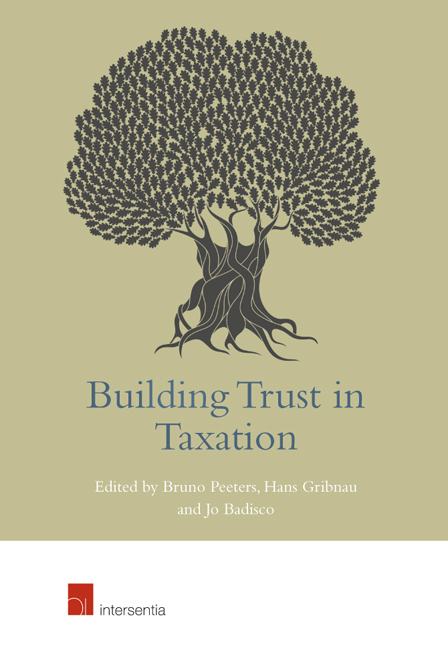Book contents
- Frontmatter
- Preface
- Contents
- List of Authors
- Introduction
- PART I TAXATION, STATE AND SOCIETY: RECIPROCITY AND THE LIMITS OF THE POWER TO TAX
- PART II Trust and morality: tax governance in need of transparency
- Taxation and Ethics: an Impossible Marriage?
- An Overview of Political Economy Issues in Taxation and Tax Reforms
- Trust in the Tax System: The Problem of Lobbying
- Restoring Stakeholders’ Trust in Multinationals’ Tax Planning Practices with Corporate Social Responsibility (CSR)
- PART III International taxation: in search of democratic legitimacy
- PART IV Behavioural aspects of taxation and trust
Taxation and Ethics: an Impossible Marriage?
from PART II - Trust and morality: tax governance in need of transparency
Published online by Cambridge University Press: 21 September 2018
- Frontmatter
- Preface
- Contents
- List of Authors
- Introduction
- PART I TAXATION, STATE AND SOCIETY: RECIPROCITY AND THE LIMITS OF THE POWER TO TAX
- PART II Trust and morality: tax governance in need of transparency
- Taxation and Ethics: an Impossible Marriage?
- An Overview of Political Economy Issues in Taxation and Tax Reforms
- Trust in the Tax System: The Problem of Lobbying
- Restoring Stakeholders’ Trust in Multinationals’ Tax Planning Practices with Corporate Social Responsibility (CSR)
- PART III International taxation: in search of democratic legitimacy
- PART IV Behavioural aspects of taxation and trust
Summary
ABSTRACT
Lemmens and Badisco take as their point of departure the current crisis in the realm of taxation, they seek to analyse the structuring elements at play beneath the apparent budgetary problems. The relationship between citizens and the government is under threat, and the trust both parties have in one another has severely diminished over the past decades. The authors of this chapter argue that the reason this relationship is damaged to such an extent has to do with the intrinsic moral content of taxation: taxation is more than a budgetary concern; it is a moral concern as well. Taxation is of key importance for the state as it is a means to realise what could be called the bonum commune. Citizens are expected to contribute a fair share to the state so the state can in turn put this money to use for the good of the state as a whole. Thus the organisation of the state is directly based and developed thanks to the income that is generated by taxation. This means that taxation is more than a mere budgetary concern; this makes it an ethical issue, as society as a whole is structured by means generated from the citizens. The ethical concept that can be used to analyse the relationship between the citizens and their government is trust. Trust is a form of willingness to cooperate that goes beyond a contractual relationship. It requires a mutual understanding and identification of both parties with one another. It is exactly this form of relationship that has come under serious threat in the crisis in taxation when we extrapolate this concept of trust to an institutional context. This diminished institutional trust has its ground in three factors: (1) the quality of the legislation is severely lacking – it has an ever-changing nature as well as a very high level of complexity; (2) the way in which certain players seem to be exempt from taxation or are treated differently from the general public and (3) the way in which taxation is organised – often governments resort to very aggressive tax policies with regard to citizens who willingly or unwillingly pay too little in taxes.
- Type
- Chapter
- Information
- Building Trust in Taxation , pp. 119 - 136Publisher: IntersentiaPrint publication year: 2017
- 2
- Cited by



